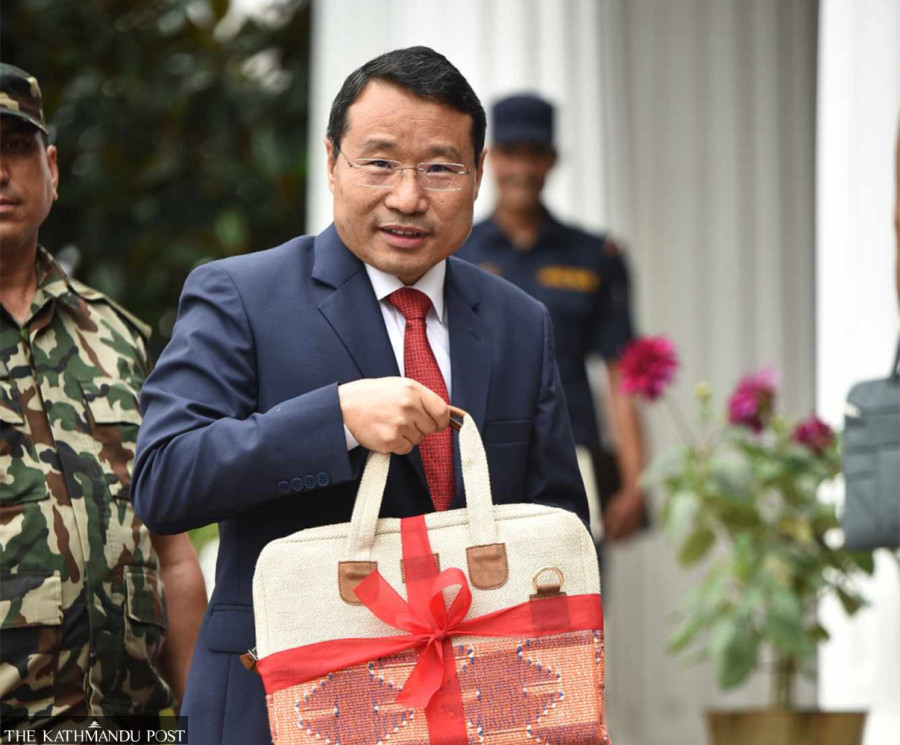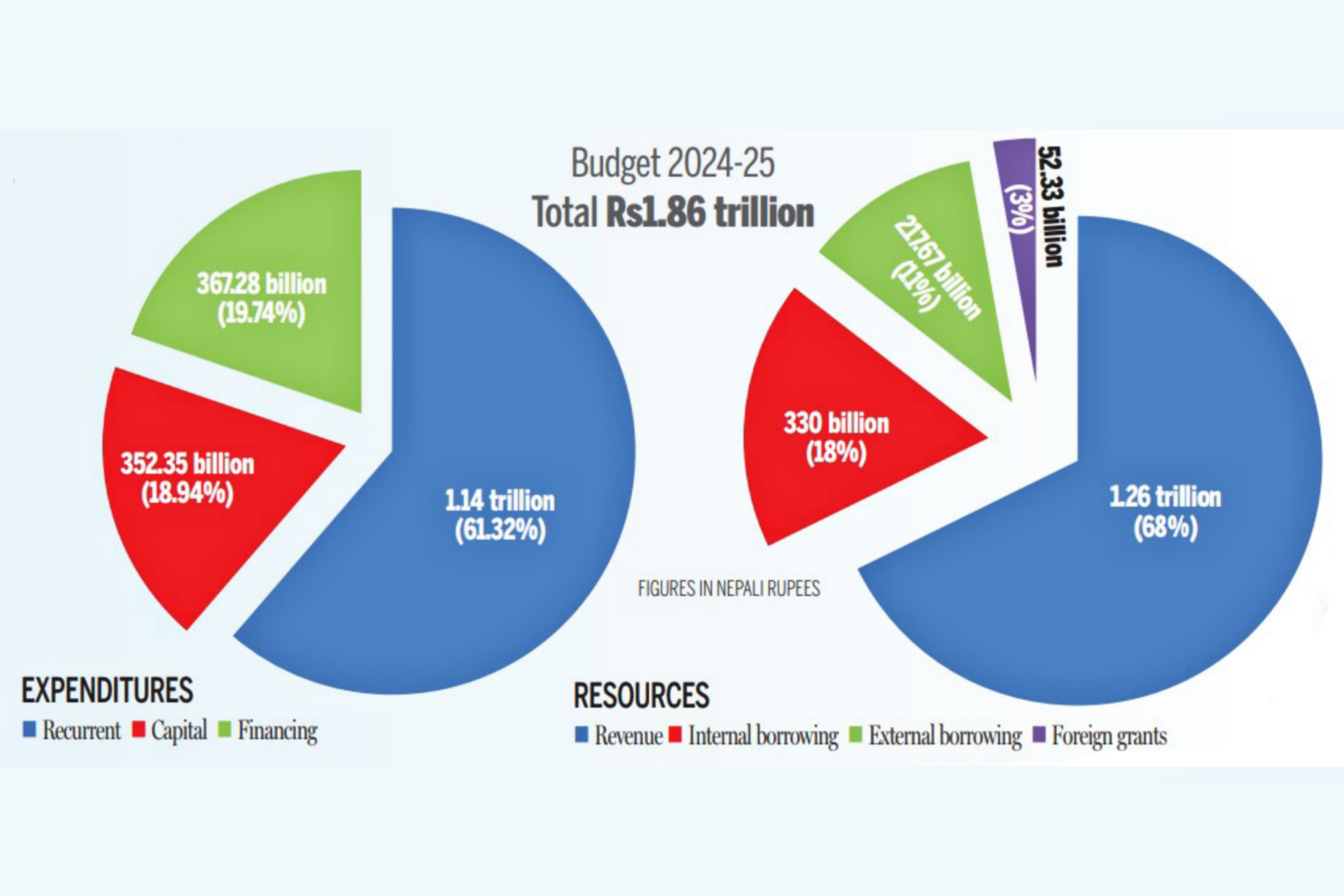Money
Rs1.86 trillion financial plan with lofty goals
Economists say the carefully organised fiscal plan is bloated and will boost growth. But it could also push up inflation.
Sangam Prasain
Following an agreement to form a parliamentary committee to investigate the cooperatives scam, Finance Minister Barsha Man Pun on Tuesday presented the country’s annual financial plan in Parliament without any roadblocks from the opposition Nepali Congress.
The budget speech, which lasted less than two hours, received applause from the lawmakers in the joint parliament session on several occasions—particularly when Pun announced the removal of VAT imposed on vegetables and fruits, and the return of at least Rs500,000 of each cooperatives depositor by recovering them from the properties of the directors.
Unlike in past years, Pun was seen carrying a bag made of local materials instead of a red or black briefcase. In his speech, he later said that the government has given priority to promoting the private sector's ‘Make In Nepal’ initiative.
The annual financial plan focused on agriculture growth, exports, and energy generation, while introducing measures to address the problems faced by credit cooperatives, is worth Rs1.86 trillion for the next fiscal year beginning mid-July.
The budget size is 6.2 percent larger than the unrevised budget of the current fiscal year.
With this expenditure, the government has targeted an economic growth rate of 6 percent for the next fiscal year and aims to cap inflation at 5.5 percent.
Some economists say pumping Rs1.86 trillion into the economy to achieve 6 percent growth and capping inflation at 5.5 percent appear to be contradictory steps.
Economists say wise money supply is vital.
If the money supply grows at a faster rate than the economy’s ability to produce goods and services, inflation will also pick up, which is likely in the next fiscal year.
In the ongoing fiscal year, the money supply in the economy has not grown fast enough, leading to decreases in production, which in turn contributed to a rise in unemployment.
The government has allocated Rs1.14 trillion, or 61.31 percent of the total budget, for recurrent spending, which consists of regular expenses such as salaries and allowances. It has set aside Rs352 billion, or 18.94 percent of the budget, for capital spending, which is used to build projects and critical infrastructure.
Similarly, the government has earmarked Rs367 billion, or 19.74 percent of the total budget, for financing.
According to Pun, the government will raise Rs1.26 trillion in revenue, Rs52.33 billion in foreign grants, Rs217.67 billion in external loans and Rs330 billion in internal loans.
Growth is slowing this year, which has divided economists and worried politicians. Thus, the budget offers even more hope than at other times.
“Overall, the budget is good. It covers almost all sectors,” said Rameshore Khanal, former finance secretary. “The industrial corridor launched by the government will help address the ongoing economic crisis by boosting industrial output.”
Economist Govinda Nepal said that, unlike the government’s policies and programmes, the budget is more balanced.
“But it has not given a clear view of how the cooperatives crisis will be settled. Similarly, the government lacks a vision to operate the new airports in Pokhara and Bhairahawa.”
He said that the budget has lofty goals, which are difficult to achieve given the uncertain political climate.
The government has raised the capital expenditure by Rs50 billion for the next fiscal year.
“For a long time, we have been unable to spend the capital budget wisely. We hope that an increase in capital expenditure will boost the economy. This is the beginning of the economic reform,” Pun told Parliament while presenting the budget.

He said the budget for the next fiscal year 2024-25 has focused on reform in three key areas.
First, boosting the slow economic growth; second, increasing the declining private sector investment and confidence; and third, improving the distressed agricultural productivity.
The government has announced the signing of the Double Taxation Avoidance Agreement with other countries to attract foreign direct investment.
“Nepal has seen low public and private investment, which has slowed the growth rate and put the country into a low-growth trap,” said Pun.
He said the budget has focused on Nepal’s graduation from the ranks of the least developed countries, meeting the Sustainable Development Goals target by 2030, and becoming a middle-income country by 2030.
Pun said the other area of focus is employment generation by boosting private sector morale to invest, and implementing skills-based learning.
The government has announced an investment decade in the agriculture sector in order to modernise it. In the next fiscal year, Rs57.29 billion is allocated for the sector.
The government has announced interest subsidies, technical support, and tax waivers on machinery imports for individuals or firms engaged in commercial farming and livestock production through contract farming on 10 bigha (6.77 hectares) in Tarai and 50 ropani (2.54 hectares] in the hills.
There are new provisions for insurance premium waivers and soft loans for seven individuals and firms producing aromatic rice as part of a pilot project on more than 100 bigha of land. They will also have easy access to chemical fertiliser, seeds, and technical support.
The government may launch commercial farming of wild animals like musk deer in mountain districts like Myagdi, Mustang, Manang, Gorkha, and Dhading.
Economist Pushkar Bajracharya said that the budget seemed focused on promoting innovation with the announcement of the agriculture investment decade, the science and technology decade, and the women's empowerment decade, which are the bases for economic transformation.
“But it’s difficult to achieve the economic growth rate as we are in a crisis, and there was no concrete initiative to bail the country out of economic slowdown.”
Finance Minister Pun said that the country will see a revolution in energy production.
He said that the government hopes to add 900MW into the national grid by the next fiscal year and take the total generation to 4,500MW in the next fiscal year. It plans to increase per capita electricity usage to 450 units.
Pun said that to meet the dry season demand, construction of four reservoir-based projects—1,200MW Budhi Gandaki, 670MW Dudh Koshi, 417MW Nalgadh, and 280MW Naumure—will begin in the next fiscal year.
He announced that the government would start the construction of the 783MW Sunkoshi III hydropower project.
The government aims to connect 100MW of solar projects from the private sector to the national grid.
The government has made orientation training free of charge for people going abroad for work. Similarly, it plans to launch a 'returnee entrepreneurship programme' for migrant workers who have returned from foreign employment. Under the scheme, at least 100,000 people will be self-employed.
The finance minister said a necessary budget has been allocated to establish consumer courts. In February 2022, the Supreme Court directed that such courts be established in all provinces.
“Activities like black-marketing and syndicating in the market will be controlled. Consumer courts will also be formed. I have allocated a budget for the purpose,” said Pun.
The government said it would provide loans for technical education, including medical education. “Law will be amended to provide loans and concessions loans for technical education in high demand.”
Pun also said that the government aims to welcome 1.6 million foreign tourists in the next fiscal year.
The finance minister also announced plans to promote Nepal as a wedding destination among foreign tourists in a bid to promote cultural and tourist destinations.
The government will lease government lands to the private sector for hotel and resort construction in order to boost tourist numbers.
The government has a target of exporting information technology-related goods and services worth Rs3 trillion in the next ten years.
Pun has said that 500,000 direct and 1 million indirect jobs will be created in the IT sector.
“Nepal will be developed as an information technology hub,” he said. “Artificial intelligence will be developed, promoted and regulated,” he said.
The government has constituted a fund of Rs1 billion to address the financial needs of startups. The government will also pass necessary laws to brand, market, and sell local alcohol.
A sum of Rs21.60 billion has been set aside for the reconstruction of earthquake-affected Jajarkot and Rukum West. The two districts were badly hit by an earthquake in November, 2023.
Chandra Prasad Dhakal, president of the Federation of Nepalese Chambers of Commerce and Industry, Nepal’s apex private sector body, said that the budget has addressed almost all of the suggestions given by the private sector.
“We had demanded the formation of a high-level reform commission to address the ongoing economic crisis, and the budget has addressed it. "Similarly, the private sector had been pushing for contract farming, which the budget addresses as well."
The budget has prioritised startups, promotion of Meetings, Incentives, Conferences and Exhibitions (MICE) tourism, and hill stations. "If the budget is implemented properly, the 6 percent economic growth target is achievable," Dhakal said.




 20.9°C Kathmandu
20.9°C Kathmandu














